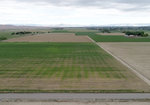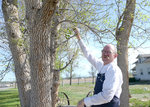Clear, 68° F
A long corridor of trees and a couple fields of crops in the Willwood area were damaged this month, when they were accidentally sprayed with herbicides by an aerial crop duster.
Up and down Lane …
This item is available in full to subscribers.
The Powell Tribune has expanded its online content. To continue reading, you will need to either log in to your subscriber account, or purchase a subscription.
If you are a current print subscriber, you can set up a free web account by clicking here.
If you already have a web account, but need to reset it, you can do so by clicking here.
If you would like to purchase a subscription click here.
Please log in to continue |
|



A long corridor of trees and a couple fields of crops in the Willwood area were damaged this month, when they were accidentally sprayed with herbicides by an aerial crop duster.
Up and down Lane 13 south of Powell, trees stand partially or completely defoliated at the height of summer.
“It whacked the snot out of them,” said Royal Stukey, one of the affected landowners.
The sprayer, Sky Aviation of Worland, has been working with the property owners to address the accidental damage.
Investigations underway
Typically, farmers apply chemicals with the use of tractors, but recent rains left the fields so moist that heavy equipment would have damaged the fields.
Murraymere Farms contracted Sky Aviation to spray multiple corn fields via helicopter. The aerial service was in high demand this season, with Murraymere but one farming operation needing to apply herbicides from the air.
Exactly what caused the herbicide to hit the wrong targets is unclear. Alyssa Gaulke, office manager with Sky Aviation, said their insurance provider is investigating the cause of the accident — poring over the sprayer data and GPS information from the helicopter. That could take a while, and until it’s complete, Gaulke said they won’t know for sure what happened.
The Wyoming Department of Agriculture inspects and licenses aerial sprayers operating in the state. Derek Grant, spokesperson for the department, said they are aware of the incident and looking into it, but they won’t know what happened until their investigation is complete.
People who saw the accident speculate a valve on the sprayer wasn’t closing properly, with chemicals continuing to fall while the helicopter circled to the targeted fields. Pilots don’t always have a good view of the sprayers from the cockpit, and their primary concern while flying is safety. So, the pilot couldn’t see the spray being applied improperly.
Stukey has a ring of ash trees around his property and a small garden that were damaged. Some of the trees were planted in the 1940s and 1950s and Stukey worries the resell value of his property has been damaged.
“It’s kind of heartbreaking to us. The trees are ugly now,” Stukey said.
He added that representatives from Sky Aviation have been very responsive in taking responsibility for the accident and assessing the damage. Stukey said company representatives met with him right after the accident occurred and have told him they would pay for any financial losses.
“They were as good as can be,” he said.
David Northrup, who farms near Stukey, had ash trees damaged, and his mother’s Chinese elm trees were also hit by wayward herbicides. His barley field was heavily damaged, and it appears a beet field is a total loss.
“There’s nothing left. It scorched that field,” Northrup said.
Like Stukey, Northrup said Sky Aviation is assuring him all financial losses will be covered.
Improper
The herbicides used were glyphosate, which is sold under the brand name Roundup, and Verdict, which is a pre-emergent weed control chemical that keeps weeds from sprouting.
Weeds have been an issue for agriculture since the Stone Age. Before herbicides, labor-intensive manual weeding and plowing were the main tools farmers used to control weeds.
With agriculture’s profit margins now razor thin, manually pulling weeds would lead to unsustainable labor costs, and extensive plowing damages soil health. The herbicides farmers use increase yields and are far cheaper than alternatives.
Murraymere Farms is trying to control kochia, a weed that completely chokes out corn.
“It’s terrible,” said Bryon Murray, who runs the farm with his family.
Without the herbicides, Murray said they’d have to end their farming operations.
When used properly, regulators say that Roundup, manufactured by Bayer, and Verdict, manufactured by BASF, are not a risk to health.
Odessa Hines, media relations manager for BASF, said about 800 requirements have to be addressed before the EPA grants registration of an herbicide.
Before the federal agency approved Verdict for use, over 200 studies were conducted.
Meanwhile, the EPA reviewed over 800 peer-reviewed studies on glyphosate, which has been used for more than 40 years. Based on its review of the scientific literature, the EPA concluded “there are no risks to public health when glyphosate is used in accordance with its current label.”
In this case, the accidental spraying fell outside the directed use.
Stukey said he and his son suffered health problems after the incident. He talked with the Poison Control Center, and they told him the symptoms he described were consistent with glyphosate poisoning; they said it wasn’t related to Verdict.
Stukey said the symptoms he and his son experienced have subsided after a little more than a week, but he still has concerns.
“I don’t like the chemical farming,” he said.
Northrup said neither he nor anyone in his family has experienced any illnesses following the spraying.
Wait and see
Josh Pomeroy, arborist with Blue Ribbon Tree Service, inspected the trees in the impacted corridor and said the trees are going to have a “tough year.” The extent of the damage won’t be fully known until next spring — but there is hope for them.
“Trees can survive chemical damage,” he said. “It’s essentially a wait and see.”
The trees will be “pushing for new growth” in an attempt to recover from the herbicides. The branches will twist as they grow, which Pomeroy said will look “alien-like.”
“That’s the best way to describe chemical damage,” the arborist explained.
He’s recommending the residents of the impacted area soak the trees well. He said not to drown the plants, as that will cause “root suffocation,” but soak them, let them dry, and repeat often.
“Essentially, you’re flushing the chemical out of the tree,” he said.
Stukey said he’s been following the advice and hoping for the best. He has seen considerable leafing on the impacted trees, and the situation looks a lot better than it did when the trees were first hit. There was some improvement on Northrup’s Chinese elms as well.
Some cottonwoods west of Road 9, though, look as though it was the middle of winter. The branches are completely bare.
A few other of the impacted residents did not return requests for interview or declined to comment.
(Editor's note: This version of the story has been corrected to reflect that the manufacturer of Roundup is Bayer, not BASF.)